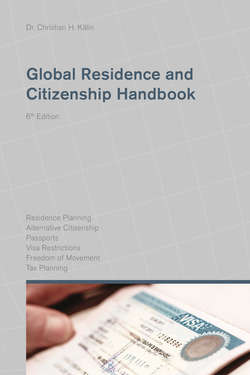Читать книгу Global Residence and Citizenship Handbook - Christian H. Kälin - Страница 33
На сайте Литреса книга снята с продажи.
Day counting
ОглавлениеIf you spend more than 183 days in any country, you are normally tax resident in that country, unless the presence there is of a strictly limited, temporary nature. If you spend no time at all in a country, you cannot be deemed tax resident.
Between zero and 183 days lies a wide range of possibilities, although normally there are some minimum thresholds of number of days below which you are ‘safe’.8
You also need to be aware of what constitutes a day spent in any particular country. Is it a full 24 hours? Is it just being present in any given day, even if just for half an hour in transit? Furthermore, the year in which the days are counted may correspond to a different period than the calendar year, depending on the country’s tax year.
Some countries rely on a territorial (or source) based tax system9 which has no impact on whether one is resident or non-resident as all income derived in that country is subject to tax, while income derived outside the country remains tax free.10 Most countries, however, have taxation on world-wide income.
Therefore (tax) residence status becomes highly relevant as most countries use residence as the key criterion for subjecting one to personal income taxes and other taxes such as capital gains or net wealth taxes. Normally, various tests are applied to determine one’s tax residence. In most countries this is determined by the number of days of physical presence in the country, in combination with other factors.
The tax authorities will also establish whether the individual has accommodation readily available and family and business interests in the country. For former countries of residence, it is important for the individual to prove that he has left permanently to establish residence in another country as this confirms bona fide residence in the new jurisdiction so that the former country will no longer tax the emigrant’s worldwide income. In some countries, this change of residence is confirmed by way of exit taxes.
The emigration of US citizens does not terminate their world-wide tax liability under Federal tax law, even if they are permanently resident in another jurisdiction. In such cases, the only way to legally relinquish US tax liability is to give up US citizenship and obtain an alternative citizenship.11
The discrepancies between the tax systems of different countries can also be used to one’s advantage in the course of changing residence. Indeed, an important element in cross-border planning is to coordinate the timing of the tax events and the taxpayer. For example, the tax treatment of income derived from activities performed before or after a person gives up his residence, and the different qualification of such income in different countries, may lead to tax savings through carefully chosen timing of a change of residence.
Finally, it is important to be aware that a change of residence will not only have an impact on one’s personal tax situation but that one’s inheritance tax situation will also be affected. Even if one is not deemed tax resident in the jurisdiction, owning real estate in that jurisdiction may be a factor and in most countries where such taxes exist will still have local inheritance tax implications.
